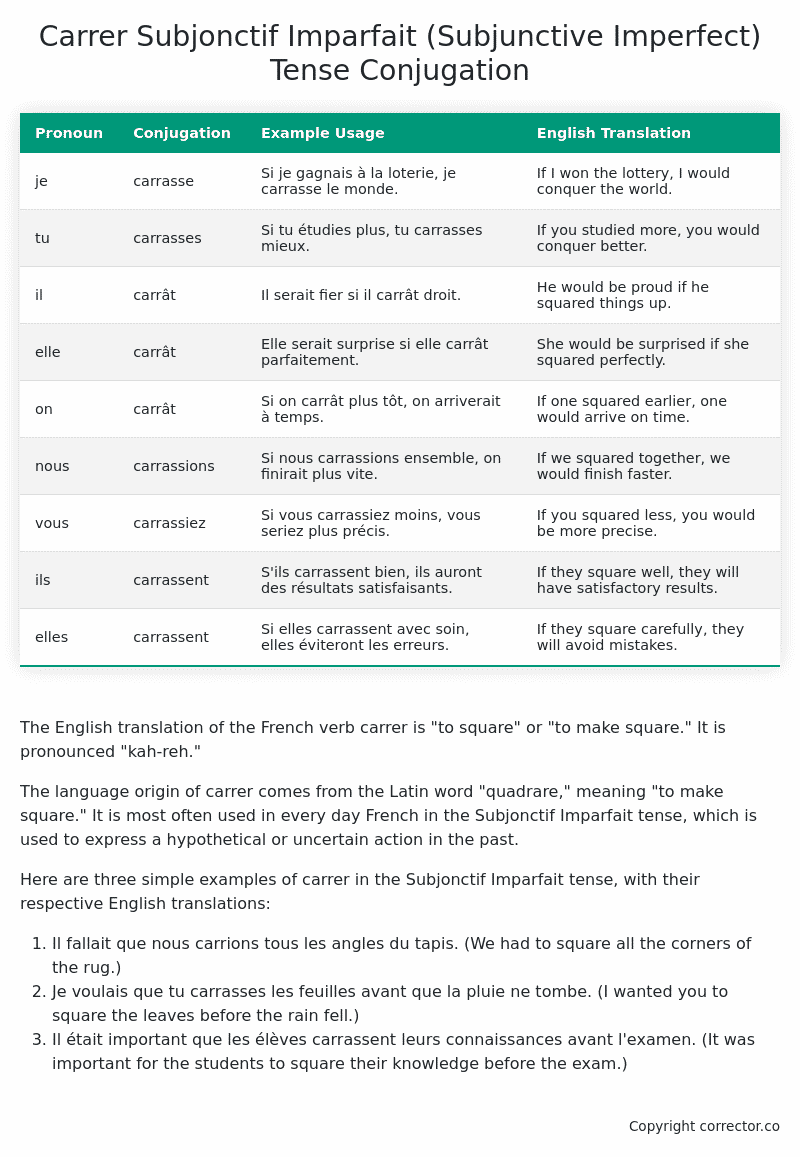Subjonctif Imparfait (Subjunctive Imperfect) Tense Conjugation of the French Verb carrer
Introduction to the verb carrer
The English translation of the French verb carrer is “to square” or “to make square.” It is pronounced “kah-reh.”
The language origin of carrer comes from the Latin word “quadrare,” meaning “to make square.” It is most often used in every day French in the Subjonctif Imparfait tense, which is used to express a hypothetical or uncertain action in the past.
Here are three simple examples of carrer in the Subjonctif Imparfait tense, with their respective English translations:
- Il fallait que nous carrions tous les angles du tapis. (We had to square all the corners of the rug.)
- Je voulais que tu carrasses les feuilles avant que la pluie ne tombe. (I wanted you to square the leaves before the rain fell.)
- Il était important que les élèves carrassent leurs connaissances avant l’examen. (It was important for the students to square their knowledge before the exam.)
Table of the Subjonctif Imparfait (Subjunctive Imperfect) Tense Conjugation of carrer
| Pronoun | Conjugation | Example Usage | English Translation |
|---|---|---|---|
| je | carrasse | Si je gagnais à la loterie, je carrasse le monde. | If I won the lottery, I would conquer the world. |
| tu | carrasses | Si tu étudies plus, tu carrasses mieux. | If you studied more, you would conquer better. |
| il | carrât | Il serait fier si il carrât droit. | He would be proud if he squared things up. |
| elle | carrât | Elle serait surprise si elle carrât parfaitement. | She would be surprised if she squared perfectly. |
| on | carrât | Si on carrât plus tôt, on arriverait à temps. | If one squared earlier, one would arrive on time. |
| nous | carrassions | Si nous carrassions ensemble, on finirait plus vite. | If we squared together, we would finish faster. |
| vous | carrassiez | Si vous carrassiez moins, vous seriez plus précis. | If you squared less, you would be more precise. |
| ils | carrassent | S’ils carrassent bien, ils auront des résultats satisfaisants. | If they square well, they will have satisfactory results. |
| elles | carrassent | Si elles carrassent avec soin, elles éviteront les erreurs. | If they square carefully, they will avoid mistakes. |
Other Conjugations for Carrer.
Le Present (Present Tense) Conjugation of the French Verb carrer
Imparfait (Imperfect) Tense Conjugation of the French Verb carrer
Passé Simple (Simple Past) Tense Conjugation of the French Verb carrer
Passé Composé (Present Perfect) Tense Conjugation of the French Verb carrer
Futur Simple (Simple Future) Tense Conjugation of the French Verb carrer
Futur Proche (Near Future) Tense Conjugation of the French Verb carrer
Plus-que-parfait (Pluperfect) Tense Conjugation of the French Verb carrer
Passé Antérieur (Past Anterior) Tense Conjugation of the French Verb carrer
Futur Antérieur (Future Anterior) Tense Conjugation of the French Verb carrer
Subjonctif Présent (Subjunctive Present) Tense Conjugation of the French Verb carrer
Subjonctif Passé (Subjunctive Past) Tense Conjugation of the French Verb carrer
Subjonctif Imparfait (Subjunctive Imperfect) Tense Conjugation of the French Verb carrer (this article)
Subjonctif Plus-que-parfait (Subjunctive Pluperfect) Tense Conjugation of the French Verb carrer
Conditionnel Présent (Conditional Present) Tense Conjugation of the French Verb carrer
Conditionnel Passé (Conditional Past) Tense Conjugation of the French Verb carrer
L’impératif Présent (Imperative Present) Tense Conjugation of the French Verb carrer
L’infinitif Présent (Infinitive Present) Tense Conjugation of the French Verb carrer
Struggling with French verbs or the language in general? Why not use our free French Grammar Checker – no registration required!
Get a FREE Download Study Sheet of this Conjugation 🔥
Simply right click the image below, click “save image” and get your free reference for the carrer Subjonctif Imparfait tense conjugation!

Carrer – About the French Subjonctif Imparfait (Subjunctive Imperfect) Tense
Formation
Common Everyday Usage Patterns
Interactions with Other Tenses
Subjonctif Présent
Indicatif Passé Composé
Conditional
Conditional Perfect
Summary
I hope you enjoyed this article on the verb carrer. Still in a learning mood? Check out another TOTALLY random French verb conjugation!


